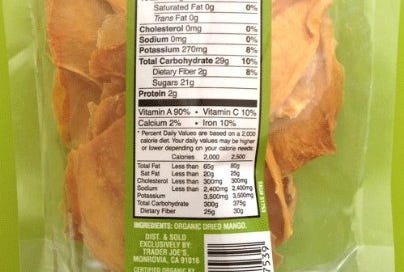Dried fruit is bad for you
With the Brazilian COVID variant presenting a still-yet-unknown global risk, let’s spend today’s newsletter talking about a less apocalyptic topic: candy masquerading as health food.
I’ve had a number of patients recently discuss the ways that they’ve been changing their diets to try to lose the COVID-15 and I’ve repeatedly heard a lot of self-sabotaging behavior.
So the TL;DR version of this newsletter is the title: dried fruit is bad for you. You should think of dried fruit the same way you think of gummy bears - packed with too much sugar, delicious, and very easy to overeat without getting full.
I’m certain that opinion will inspire some disagreement. If you read content from the Harvard School of Public Health, you’ll be under the impression the dried fruits are packed with nutrients and deserve a prominent a place in your diet.
This is nonsense. I’m going to make my case.
Dried fruit let’s you streamline huge amounts of sugar with impressive speed
You may have heard about the concept of glycemic index before, which basically refers to how quickly your body can breakdown the carbohydrates in an object. Glycemic index is impacted by a million different factors in food, including fiber, complexity of the carbohydrates, other nutrients, and whether or not the food is cooked.
When you read about glycemic index and dried fruit, you can be mislead into thinking dried fruit is good for you.
But this tells an incomplete story. Glycemic index (GI) is an intrinsic property of the specific type of food, it isn’t reflective of what happens in the real world.
GI neglects glycemic load - the total amount that you consume - as well as velocity - the speed at which you consume it. Dried fruit causes problems because it’s so easy to consume the same amount of sugar that’s in a can of soda without thinking. Because all the water is removed, you can eat a whole plum in one bite. So in the time it would take you to eat a single fresh fruit, you can easily consume many multiples of that dried.
As a result, you get a bolus of sugar delivered at a totally unnatural speed.
And the amount of sugar there is not trivial! And keep in mind with those numbers, that’s only the “recommended serving size” that is unlikely to reflect how much many of us are eating:
The concept of “no added sugar” is a scam
These items are marketed to you as healthy because they have “no added sugar” with the suggestion that if the sugar isn’t added to the item, it can’t be harmful to you.
But your body doesn’t know the difference between fructose from an apple and fructose from high fructose corn syrup.
Marketers are really clever, and the health washing around natural sugars has been a brilliant boon to the bottom line of food producers.
So with dried fruit you get the perception of a health halo because of a short ingredient list and “no added sugar” but at the end of the day your body can’t tell much of a difference between a box of raisins and a glass of grape juice (or a can of soda for that matter).
The result is a lot of work for your liver to handle the fructose, which it won’t be happy about.
The other thing that the marketers will use to manipulate you: nutrient density
When you read an article from a nutritionist pushing dried fruit, or even a source like WebMD or the Harvard School of Public Health, you’ll probably read about the “nutrient density” as an explanation of why this is good for you.
The argument is that because all the water is removed, you get more potassium, magnesium, polyphenols, antioxidants, and an alphabet soup of other organic compounds that are supposed to turn these sugar bombs into superfoods.
I think that this is nonsense.
Antioxidants are overhyped - while there’s likely a benefit to your health from eating the colorful compounds contained in a variety of plant matter, it’s far from a health panacea. I am totally unpersuaded that antioxidants protect us from cancer or heart disease in the way that we’re led to believe.
It’s a marketing scam, and you should think of it accordingly.
Oh, and anything that you’ll read about the “link” between dried fruits and health is based on crappy studies that you can’t trust.
The bottom line: this is dessert pretending to be a healthy snack
Food manufacturers and grocery stores don’t care about whether you’re healthy or not. They just want to sell you more food.
This means that no one is going to advocate for you to be told the truth about what they’re trying to sell you.
As a consequence, you need to be your own advocate.
I’m not suggesting that you throw away the bag of dried mangoes that you just bought from Trader Joe’s.
All I’m saying is that you shouldn’t believe that dried fruit is something you add to your diet to make it more healthy.
I expect this will be a surprising perspective to some. And I’m certain that many of you will disagree. If I am curt, then I apologize.
Thank you for reading! If you’re enjoying my newsletter, please consider sharing with your friends and family and encouraging them to subscribe!
I always appreciate any feedback or thoughts you might have. You can reply directly to this email to reach me directly.




